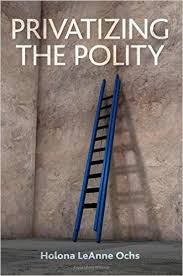Tuesday, September 27, 2016 - 12:00pm
Williams Hall, Room 070

Holona Ochs
Associate Professor of Political Science
Holona Ochs came to public policy work from a career as a marriage and family therapist, where she witnessed first-hand the effects of policies on people. As a result, much of her research has explored the consequences of policies—both social and governmental—on the individuals and groups they are explicitly designed to assist.
Privatizing the Polity examines 18 years of data from 1990 to 2008 and tracks the changes enacted by welfare reform, the 1996 deal struck between Congressional Republicans and then-President Bill Clinton. Welfare reform policies have increasingly led to private sector management of its implementation, resulting in wide variations in the program’s structure from state to state.
The main finding: Poverty is more entrenched than ever. People living in poverty are working more for less money. In addition, more people are becoming impoverished as the privatizing of welfare has resulted in the transfer of money from low-income populations to the wealthy. In other words, with the private sector profiting financially from some aspects of welfare - such as through the collection of interest and fees on child support payments - less money is staying in the hands of welfare
recipients as it moves into the coffers of business owners.
According to Ochs, the net effects of welfare reforms have not produced broad-based opportunities to move out of poverty. In fact, the more people living in poverty work, the more intense poverty is in the aggregate over time. But the framework for understanding poverty governance as a system presented in Privatizing the Polity outlines the myriad opportunities for learning more about what works in different contexts so that these aggregate trends may be reversed.
Privatizing the Polity proposes numerous areas ripe for further exploration, including the potential for social entrepreneurship to generate opportunities, proactive strategies for addressing biases that perpetuate disparities in access to opportunities and interventions that reduce the risk of domestic violence, which plays a key role in the feminization of poverty.
Investments in microenterprise and social entrepreneurship that follow the tradition of “do for self” are among the examples of proactive strategies for improving the conditions of impoverishment while simultaneously addressing biases that hinder development in low-income communities. Efforts to utilize the various sources of funding for welfare efforts (e.g.; Temporary Assistance for Needy Families, Community Development Block Grants, and Workforce Investment Act funds) to foster small business development in impoverished communities by the people living in those communities have tremendous promise as antipoverty measures, particularly where women and minority-owned business are supported.
Bring Your Own Lunch • Beverages and Dessert Provided
Department:
Women, Gender and Sexuality Studies
